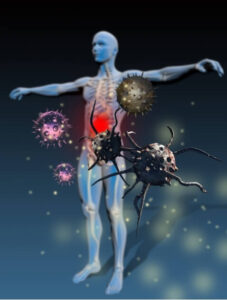
Migraines are infamously complex, with various triggers and causes that vary widely from person to person. Recently, researchers have been investigating a lesser-known factor that may contribute to migraines: infections.
While migraines are often associated with stress, diet, or lifestyle factors, studies now indicate that infections, including bacterial and viral infections, might play a role in triggering or exacerbating migraine attacks.
The Immune System’s Role in Migraines
Migraines are frequently described as a “neurovascular” disorder, involving dysfunction of both nerves and blood vessels. However, emerging research suggests that the immune system might also play a significant role in migraine attacks. When the body detects an infection, the immune system releases pro-inflammatory cytokines—proteins that aid in fighting infection but also cause inflammation. For some people, this inflammation can affect the brain and nervous system, potentially leading to migraines.
Research published in The Journal of Headache and Pain suggests that inflammatory responses, such as those experienced during infections, may increase the likelihood of a migraine. For instance, respiratory infections are known to be associated with migraine attacks, possibly due to heightened immune activity and the resulting inflammation during and after such infections.
Specific Infections Linked to Migraines

1. Sinus and Respiratory Infections: Sinus infections and colds are often reported as migraine triggers. A study published in Cephalalgia found that patients with upper respiratory infections experienced an increase in migraine frequency. These infections can cause inflammation in the nasal and sinus cavities, leading to pain and pressure that may trigger migraines, particularly in those who are prone to headaches.
2. Gastrointestinal Infections: Recent research is exploring the relationship between gut health and migraines, known as the “gut-brain axis.” Bacterial infections or imbalances in gut bacteria can trigger inflammation throughout the body, potentially contributing to migraines. Some research even suggests that gastrointestinal infections, such as Helicobacter pylori (known for causing stomach ulcers), could increase the risk of migraines.
3. Viral Infections: Viruses, especially those causing the flu or common colds, can also trigger migraine attacks. During a viral infection, the immune response can lead to widespread inflammation, which increases pain sensitivity and may trigger migraines. Ongoing studies are examining whether latent viral infections, like the Epstein-Barr virus (linked to glandular fever), could have long-term impacts on migraine frequency in some individuals.
4. COVID-19 and Migraine Symptoms: The COVID-19 pandemic has drawn more attention to the connection between viral infections and migraines. Many individuals who have recovered from COVID-19 report prolonged headache symptoms, including migraines. Research in The Journal of Headache and Pain has documented this connection, with some patients experiencing more frequent or severe migraines following COVID-19. This has prompted further research into how infections can cause lasting effects on the nervous system and increase vulnerability to migraines.
What This Means for Migraine Management
Recognising that infections can trigger migraines opens up new avenues for treatment and prevention.
Below are a few strategies for those experiencing migraines and looking to minimise the impact of infections:
- Strengthen the Immune System: Maintaining a balanced diet, staying hydrated, and getting enough sleep can help your body ward off infections and potentially reduce migraine triggers.
- Avoid Known Triggers During Illness: If you’re prone to migraines, try to avoid other common triggers such as caffeine, alcohol, or lack of sleep when you’re unwell.
- Consider Anti-Inflammatory Medications: For some individuals, taking anti-inflammatory medication at the onset of an infection may help prevent the inflammation that could trigger migraines.
- Practice Preventative Measures: Frequent hand-washing, managing stress, and getting vaccinated for preventable illnesses, such as the flu, may reduce the risk of infections that could lead to migraines.
The Future of Research on Infection and Migraine
Research continues to evolve to better understand how infections contribute to migraines, with scientists investigating the roles of the immune system, inflammation, and nerve sensitivity.
While this field is still developing, the connection between infections and migraines is an important area of study that may lead to more effective treatments.
If you experience migraines after infections or suspect that infections may be triggering your migraines, consulting a headache specialist or healthcare provider can help you develop a personalised management plan.
At the Sydney Headache and Migraine Clinic, we stay updated on the latest migraine research and are dedicated to supporting our patients with comprehensive migraine management strategies.
Written by:
References:
- Peterlin, B. L., & Tietjen, G. E. (2008). Migraine and Inflammation: The Emerging Role of Microglial Activation. Headache: The Journal of Head and Face Pain.
- Parashar, R., et al. (2020). Association of Migraine with Gastrointestinal Disorders: A Review. The Journal of Headache and Pain.
- Headache and the novel coronavirus (COVID-19) pandemic: a literature review. The Journal of Headache and Pain.
Disclaimer: This blog is for informational purposes only and is not a substitute for professional medical advice, diagnosis, or treatment. Always seek advice from your healthcare provider with any questions you may have regarding a medical condition or treatment. Never disregard professional advice or delay seeking it based on information you have read here.







